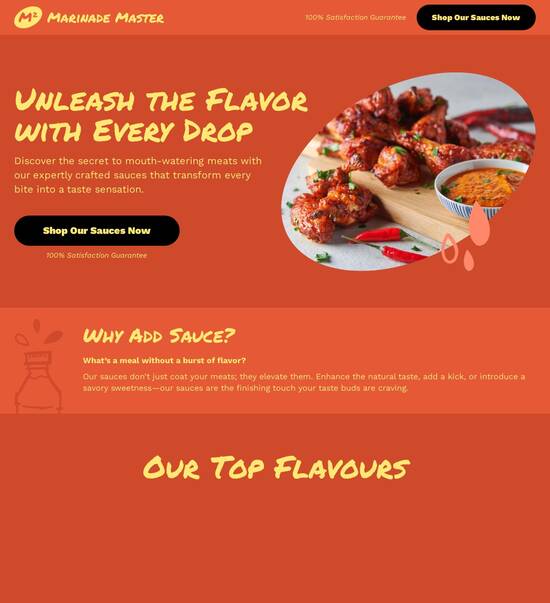
404 error page template optimized for Android Wear
Explore Similar TemplatesAbout template
Design using a responsive 404 error page template that delivers a flawless experience on Android Wear. Try Instapage today!
Recommended templates

Easy to build without coding
With the intuitive drag-and-drop builder, anyone on your team can create high-converting pages without any knowledge of code or design. Make enhancements to your landing page with custom widgets using Javascript, HTML/CSS, or third-party scripts.

Multiple layouts for any industry and goal
Select from 500+ landing page layouts built to boost conversions across industry-specific scenarios. Customize them by adjusting fonts, adding images, and generating on-brand content with the AI assistant. Quickly scale with Instablocks® and Global Blocks that you can save, reuse, and update globally.

Loads fast and looks polished on any device
Every template is responsive, which means they present professionally on any device and load blazingly fast with our Thor Render Engine. You can also power them up with Google AMP technology to deliver an unparalleled mobile experience and drive higher conversions.

Robust analytics & experimentation
Get real-time updates and reporting across all your devices, showing the number of visitors, conversions, cost-per-visitor, and cost-per-lead. Launch AI-powered experiments, run A/B tests, and use heatmaps to analyze user behavior, then optimize your landing page to maximize conversions.







Easy to build without coding
With the intuitive drag-and-drop builder, anyone on your team can create high-converting pages without any knowledge of code or design. Make enhancements to your landing page with custom widgets using Javascript, HTML/CSS, or third-party scripts.
Multiple layouts for any industry and goal
Select from 500+ landing page layouts built to boost conversions across industry-specific scenarios. Customize them by adjusting fonts, adding images, and generating on-brand content with the AI assistant. Quickly scale with Instablocks® and Global Blocks that you can save, reuse, and update globally.
Loads fast and looks polished on any device
Every template is responsive, which means they present professionally on any device and load blazingly fast with our Thor Render Engine.
Robust analytics & experimentation
Get real-time updates and reporting across all your devices, showing the number of visitors, conversions, cost-per-visitor, and cost-per-lead. Launch AI-powered experiments, run A/B tests, and use heatmaps to analyze user behavior, then optimize your landing page to maximize conversions.
All the features you need to build lead-generating landing pages
Explore more featuresLearn how to build top-performing landing pages for any goal
FAQs
Leading the way in building high-performing landing pages





A comprehensive guide to optimizing landing pages with Instapage
Effective landing pages are essential for maximizing ROI in digital marketing campaigns. Instapage offers a powerful platform designed to empower marketers to create, optimize, and scale their campaigns seamlessly. By leveraging extensive templates, personalization tools, and collaboration features, users can significantly enhance their lead generation efforts without the complexity.
Understanding the importance of landing page optimization
Optimizing landing pages is critical for converting visitors into leads and customers. Instapage ensures that marketing teams in various sectors, such as technology, education, and financial services, have the right tools to design high-impact landing pages. Key aspects include understanding audience behavior and applying effective A/B testing methodologies.
- Utilize heatmaps to track user interactions: Observing where users click can help refine page layouts and content placement, leading to better conversion rates.
- Implement A/B testing: Testing different versions of landing pages reveals which elements resonate more with your audience, ensuring a continual improvement process.
- Personalize user experiences: By tailoring content to specific audience segments, you increase the likelihood of engagement and conversion.
Step 1: Choosing the right template
Starting your landing page journey with Instapage involves selecting the right template suited to your campaign goals. With over 100 high-converting templates, you can easily find one that aligns with your marketing objectives.
Step 2: Customizing your landing page
Once you've chosen a template, it's time to customize it to fit your brand's identity. Consider the following key areas:
- Adjust visuals and graphics: Ensure that images and colors reflect your brand and the specific message you want to convey.
- Edit text for clarity and impact: Craft clear, compelling headlines and calls to action that drive user engagement.
- Incorporate lead generation elements: Add forms and calls to action that make it easy for visitors to engage and convert.
Step 3: Utilizing built-in optimization tools
After customizing, it's crucial to optimize your landing page for maximum effectiveness. Take advantage of Instapage's built-in features:
- Use analytics dashboards: Monitor page performance and refine strategies based on real-time data.
- Experiment with dynamic text replacement: This feature allows for personalized messaging based on the ad clicked, enhancing relevance to the user.
- Leverage collaboration tools for feedback: Share the landing page with your team and stakeholders for instant feedback and collaborative improvement.
With these steps, marketers can dramatically enhance their digital strategy through effective landing page management.
Ready to amplify your campaign performance? Sign up for Instapage today and start optimizing your landing pages to achieve remarkable results.
People also ask about 404 error page template optimized for Android Wear
Crafting a 404 error page template for Android Wear: A comprehensive guide
Understanding the essentials of 404 error pages
A 404 error page is displayed when a user attempts to access a web page that cannot be found. It plays a crucial role in maintaining user engagement and navigation within a website. A well-structured error page informs users that the content they sought is unavailable, while guiding them back to relevant content or the homepage. It's key for maintaining SEO rankings as it helps in managing the site's link structure.
The significance of error pages extends beyond mere user navigation; they can impact the overall perception of a brand. Visitors expecting a seamless experience may feel frustrated upon encountering a dead end. This frustration can lead to high bounce rates, which negatively affects site visibility and engagement metrics. Thus, investing in an informative and comforting error page is essential.
Definition: Communication that a page doesn't exist anymore.
Importance: Maintains navigation flow and guides users.
Visitor impact: Can evoke frustration but salvageable with good design.
The unique challenge of designing for Android Wear
Designing for Android Wear presents distinctive challenges due to its small screen size and unique user interaction techniques. Unlike traditional web pages, Android Wear applications require a design that is highly optimized for quick glances rather than deep interactions. This means that a 404 error page must communicate its message efficiently without overwhelming the user with text or cluttered visuals.
Another critical factor is the time-sensitive nature of interactions on wearable devices. Users often seek instant results, meaning that any error page must facilitate quick alternatives. Considering the limitations of Android Wear, designers should think creatively to provide useful navigational solutions without compromising aesthetics.
Distinct features: Small screen limits detailed interactions.
User interaction: Requires quick, uncomplicated responses.
Responsive design: Must adapt visuals effectively for small devices.
Key components of an optimized 404 error page
A clear and concise message forms the backbone of an effective 404 error page. Crafting a friendly yet informative message reassures users that they have not made a mistake, thereby alleviating possible frustration. An effective message should use simple language, avoiding jargon to ensure clarity. For instance, a message like 'Oops! This page doesn't exist. Let's get you back on track!' is inviting and manages to convey the error clearly.
Additionally, providing navigational solutions helps redirect users to relevant content. This can include links to alternative pages, popular sections of the site, or a direct return to the homepage. Visual elements, such as recognizable icons and appealing design elements, can further enhance user understanding while retaining an aesthetically pleasing look.
Messaging: Simple, friendly, and informative language.
Navigational solutions: Links or buttons redirecting users.
Visual elements: Use of icons and images for clarity.
Creative design ideas for 404 error pages on Android Wear
Incorporating brand identity into a 404 error page can reinforce user trust, even in moments of confusion. Using consistent color schemes, logos, and design elements familiar to the user helps to create a cohesive online presence. This not only aids in brand recall but can also ease any frustrations caused by encountering an error page.
Additionally, engaging animations can turn a potentially negative experience into a more entertaining one. Subtle animations or micro-interactions can capture users' attention and keep them engaged. Humor can be a great ally in this respect; a light-hearted message can lighten the mood, for instance, 'Looks like we took a wrong turn. Let's head back!' This helps to maintain a positive brand image.
Brand identity: Consistent logos and colors for trust.
Engaging animations: Visual elements to capture attention.
Humor and creativity: Light-hearted messages reduce frustration.
Enhancing user experience with functional elements
Quick access functions are vital in a 404 error page on Android Wear. Incorporating buttons for immediate actions such as search or returning to the home page enhances user engagement. This allows users to maintain a sense of direction and also encourages them to explore available content, instead of leaving the site out of frustration.
Contextual help is another functional aspect that can significantly improve the user experience. Offering tooltips or hints focused on site navigation can assist users in finding their way. Tailored recommendations based on past visitor behavior can further guide users effectively, creating a personalized browsing experience even within an error context.
Quick access functions: Direct buttons for navigation.
Contextual help: Tooltips and hints for guidance.
Tailored recommendations: Personalized redirects for better relevance.
Testing and optimization techniques
A/B testing different designs can help determine which approach yields the best user engagement and satisfaction. By comparing various components—from messaging to visual layouts—marketers can gather actionable insights to constantly enhance the error page's effectiveness. Metrics such as bounce rates and time spent on the page are crucial opportunities for evaluation.
User feedback mechanisms are essential in this iterative process. By collecting insights through surveys or observational feedback, businesses can understand user sentiments towards their error pages. Continuous improvement practices become integral as brands refine their 404 error pages, ensuring that they remain relevant and effective over time.
A/B testing: Comparing designs for user engagement.
User feedback: Gathering insights for improvements.
Continuous improvement: Regular updates for relevance.
Real-world examples and case studies
Looking at success stories from leading brands can provide valuable insights into effective error page design. Brands that invest time and effort in crafting user-centered error pages often see a notable decrease in bounce rates. Analyzing these pages reveals key features such as humor, friendly messaging, and strong navigational tools that enhance user retention.
Conversely, lessons can be drawn from ineffective error pages that fail to engage users. Common pitfalls include generic error messages or overly complicated designs that detract from quick navigation. These examples serve as reminders of the critical importance of user-centric design in preventing lost traffic.
Success stories: Analyzing effective designs from notable brands.
Ineffective examples: Learning from poor execution.
Actionable insights: Drawing conclusions from both good and bad designs.
The future of 404 error pages in digital experiences
As technology continues to advance, the design of 404 error pages must also adapt to emerging trends. Future designs may integrate artificial intelligence to provide real-time suggestions tailored to user preferences and behavior. This evolution presents the opportunity for error pages to become blurred with personalized brand experiences, making disruptions feel less burdensome.
Integrating these pages within broader digital strategies will be crucial for brands moving forward. Understanding how users interact with these pages can help drive overall site performance management when considering customer journeys. Crafting error pages that align with brand objectives plays a significant role in enhancing user satisfaction and brand loyalty.
Emerging trends: AI enhancements for personalized interactions.
Broader strategy integration: Aligning error pages with brand goals.
User interaction insights: Driving overall site performance.
Summary of key takeaways
In conclusion, an optimized error page template for Android Wear is essential for maintaining user engagement and satisfaction. Understanding its role helps organizations create a resourceful experience even in moments of confusion. Attributes such as clear messaging, functional navigation, and brand identity should be prioritized during the design process.
Embracing innovative design choices will lead to a more enjoyable experience and provide long-term benefits by instilling brand trust. With continually evolving trends in user interaction, brands must remain agile in keeping their 404 error pages relevant and effective, ensuring that they align with overall marketing strategies.
Ready to skyrocket conversions?
Supercharge your ad campaigns with high-performing landing pages
Get started














